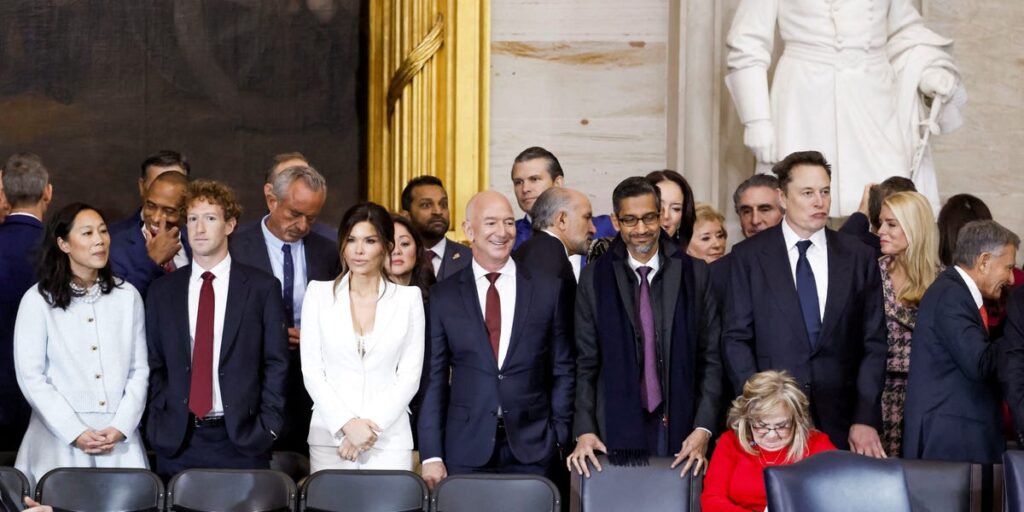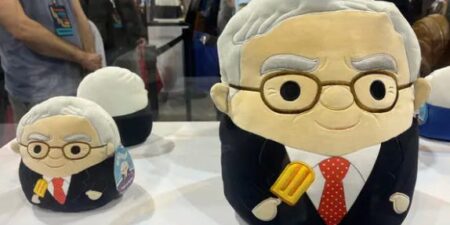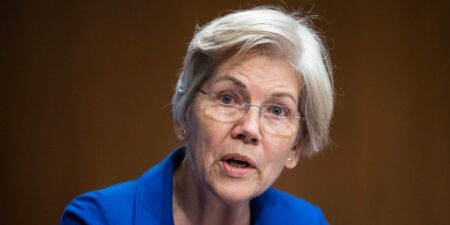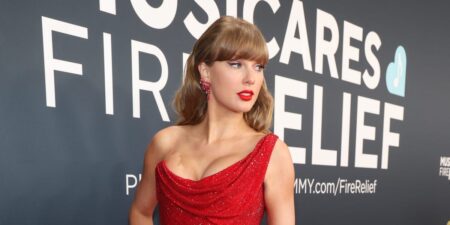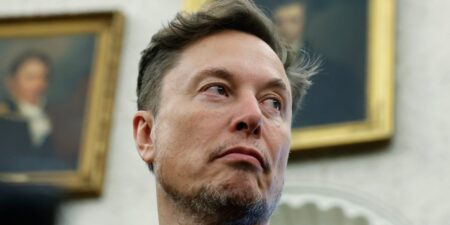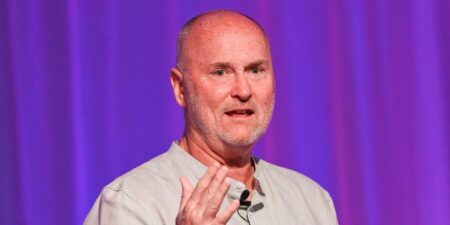Updated
X
Bluesky
Copy link
Impact Link
Save
Saved
Read in app
subscribers. Become an Insider
and start reading now.
Have an account? .
- Many tech leaders tried to get close to Trump after the election, donating to his inaugural fund.
- One expert told BI that it’s been a “rocky road” since then for Silicon Valley leaders and Trump.
- Here’s where some of tech’s big names — and businesses — stand with Trump more than 6 months in.
Some of the biggest tech leaders tried to get in President Donald Trump’s good graces before he took office for a second time, meeting with him at his Mar-a-Lago resort and snagging prime spots at the inauguration.
More than six months into his presidency, many of those tech leaders are now dealing with tariffs and other potentially disruptive policies, like immigration restrictions, that could impact their bottom lines. Other White House policies, however, could be a boon to tech companies, like the “AI Action Plan” released in July, which pushes for lighter AI regulation.
At the time of writing, many new tariffs are scheduled to go into effect on August 7. Trump previously exempted some electronics from the harshest levies on China and instead said they would be moved to a different tariff “bucket,” but the future of those tariffs remains unclear. Talks between the White House and China are on a separate track from the other nations, and the current deadline for the world’s two largest economies is August 12.
Here’s where some of the biggest tech leaders — and their companies — stand with the president now.
Representatives for Meta, Nvidia, and Amazon declined to comment to Business Insider in April. Representatives for the White House and other companies did not respond to a request for comment from BI.
Elon Musk: Tesla, SpaceX, xAI, X, Boring Company, Neuralink
Elon Musk spent at least $277 million backing Trump and Republicans during the election and was the public face of the White House DOGE office, but the two have had a spectacularly messy, public breakup since. Trump has oscillated between threatening to cancel Musk’s many government contracts and promising he’s not trying to “destroy” the entrepreneur’s companies.
The world’s richest man has since seemed to change his political tune and even formed a new political party. All the while, Tesla’s stock has suffered quarter after quarter due to a widespread protest movement and plummeting sales.
Musk said on a second-quarter earnings call that the company “could have a few rough quarters,” partly given the coming expiration of EV tax credits and ever-changing tariffs. He added that Tesla, which saw its steepest year-over-year revenue drop in at least a decade, was in a “weird transition period,” but teased a Robotaxi expansion. As of market close on August 1, the stock was down more than 28% since the day after the inauguration.
Other than Tesla, Musk’s companies are privately held. SpaceX, his rocket company, is offering hefty salaries to AI talent.
Mark Zuckerberg: Meta
Mark Zuckerberg and Trump have a tumultuous history, but the Facebook founder has tried to patch things up. The Meta CEO called Trump a “badass” before the election and ended fact-checking on Meta platforms. The company donated $1 million to the inaugural committee. In May, Zuckerberg said that a strong relationship between Big Tech and government is “necessary” for progress.
Court proceedings began in April in the Federal Trade Commission’s blockbuster trial against Meta. The government is trying to force Meta to sell Instagram and WhatsApp, arguing that the company operates as an illegal monopoly. Zuckerberg was the first witness and testified for hours.
Before the trial, Zuckerberg tried to have the suit dismissed. The FTC asked for $30 billion to settle, but Zuckerberg offered only about $1 billion, according to The Wall Street Journal.
Meta released second-quarter earnings on July 30 and exceeded analysts’ expectations. Though the company’s digital ad market could suffer from tariffs, it has so far remained strong. As of market close on August 1, the stock was up more than 21% since the day after the inauguration.
Sundar Pichai: Alphabet
Alphabet CEO Sundar Pichai visited Trump at Mar-a-Lago after the election, and Google donated $1 million to the inauguration fund.
The company hasn’t been spared from lawsuits — in April, the Department of Justice kicked off a remedy hearing for Google, where it will decide the company’s fate after a previous ruling that it’s a monopoly. One proposed solution is separating Chrome, Google’s flagship search engine. Google has said it intends to appeal the case, and an executive said in a blog post that the DOJ’s proposed solutions are “unnecessary and harmful.”
Pichai said on an episode of the “Decoder” podcast in May that he would not — and cannot — adjust search ranking to please Trump.
Alphabet, Google’s parent company, beat expectations with its second-quarter earnings, though investors were wary of how much money the company said it plans to spend. As of market close on August 1, the stock was down more than 4% since the day after the inauguration.
Jensen Huang: Nvidia
Unlike many of his counterparts, Nvidia CEO Jensen Huang did not attend Trump’s inauguration. He spent the day celebrating Lunar New Year with employees in Asia. He met with Trump shortly after, however, and Nvidia donated $1 million to the inaugural committee.
The chipmaker sources many of its semiconductors abroad, primarily in Taiwan, making the trade environment potentially tricky. Yet in a March interview with CNBC, Huang sounded relatively calm about tariffs, saying that he’s “enthusiastic” about building in the US and that “in the near term, the impact of tariffs won’t be meaningful.”
In April, the Trump administration told Nvidia that it would need to have a special license to sell to Chinese consumers, which the company said could lead to a multibillion-dollar earnings dip. Huang met with Trump, though, and Nvidia announced it would resume delivering its H20 chips to China on July 14, having gotten assurances that the government would approve the shipments. Earlier that month, Nvidia became the first company to reach a $4 trillion market cap.
As of market close on August 1, the stock was up more than 23% since the day after the inauguration.
Tim Cook: Apple
Apple CEO Tim Cook personally donated $1 million to the inaugural committee and attended the event. He also had dinner with Trump at Mar-a-Lago after the election.
Apple is vulnerable to tariffs, as the company manufactures many of its products in China, and Trump has threatened 25% fees on iPhones made outside the US. Analysts predicted that the original tariffs could massively drive up iPhone prices.
Democratic Sen. Elizabeth Warren of Massachusetts sent Cook a letter in April asking for more information about his reported efforts to get specific tariff exemptions. She wrote that they “raise fresh concerns” about corporations’ abilities to “gain special favors.”
The company said it was ramping up production in India, but in May, Trump said he had a “little problem” with Cook and didn’t approve of the focus on Indian manufacturing. By July, a top White House trade advisor bashed Apple for failing to move production out of China. Apple announced in July that it was investing $500 million in a US producer of rare earth magnets that are used in Apple devices.
Apple beat Wall Street’s estimates with its third-quarter earnings. During the earnings call, Cook said the company had taken an $800 million hit from tariffs and that the figure will likely reach $1.1 billion by the September quarter. As of market close on August 1, the stock was down more than 9% since the day after the inauguration.
Jeff Bezos: Amazon
In addition to his role as the founder and executive chairman of Amazon, Bezos also owns The Washington Post. During the most recent election, he sparked controversy by deciding that the WaPo wouldn’t endorse a candidate.
After Trump won, Bezos had dinner with Trump and Musk at Mar-a-Lago. Amazon donated $1 million to the president’s inaugural committee, and Bezos and his then-fiancée attended the inauguration.
Amazon is facing an ongoing antitrust lawsuit from the FTC and tariffs look set to affect the company. Some Amazon sellers have had to raise prices, though a representative for the company previously told BI only a “tiny fraction of items in our store” have been affected.
In May, Amazon faced backlash from Trump over a report that it was going to display the cost of tariffs next to some items (Amazon denied the report). During a second-quarter earnings call, executives said the company hadn’t seen much of an impact from tariffs during the first half of the year.
As of market close on August 1, the stock was down more than 6% since the day after the inauguration.
Shou Zi Chew: TikTok
TikTok is running up against the clock — Trump has repeatedly paused enforcement of a US ban to try and broker a deal with potential bidders for the company in America. On June 19, Trump gave the social media giant another 90 days to find a new owner. Trump has tasked Vice President JD Vance with overseeing negotiations about a potential deal.
CEO Shou Zi Chew met with Trump in December and attended the inauguration. TikTok spent $50,000 on an inauguration party for Gen Z and influencers that helped spread the president’s campaign message. The app’s future remains uncertain.
TikTok is owned by ByteDance, a privately owned Chinese company.
Sam Altman: OpenAI
OpenAI CEO Sam Altman personally gave $1 million to Trump’s inaugural fund and attended the event. He also visited the White House early in Trump’s term to announce Stargate, a $500 billion private-sector AI infrastructure investment that spurred a public spat with Musk.
The company gave the White House recommendations for an “AI Action Plan” and advocated for a light regulatory environment. When Trump announced some major AI tech deals during a Gulf tour in May, Altman called the moves “extremely smart” and said anyone criticizing them was “naive” in a post on X. In July, the OpenAI CEO told reporters that he was pleased with the Trump administration’s work on AI.
OpenAI is a privately held company. At the end of March, it announced a new funding round that put its valuation at $300 billion.
Satya Nadella: Microsoft
Microsoft CEO Satya Nadella didn’t attend Trump’s inauguration but did congratulate him online, like many other tech leaders. Microsoft donated $1 million to the inaugural fund. A provision about research and development expensing in the president’s signature spending bill that passed in July could benefit Microsoft in particular. After reporting strong fourth-quarter earnings on July 31, Microsoft became the second company to ever pass a $4 trillion market cap.
As of market close on August 1, the stock was up more than 22% since the day after the inauguration.
Read the full article here







